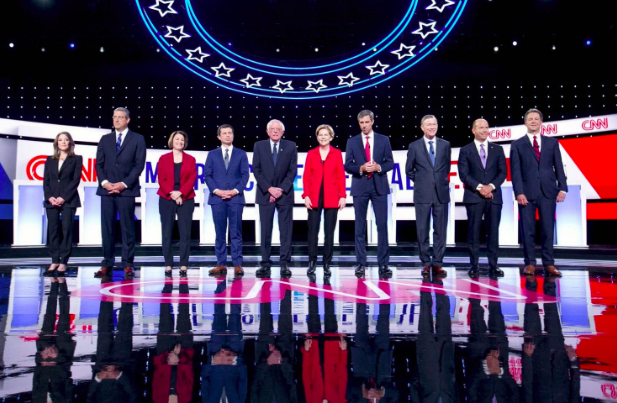By Erin Maxwell || Contributing Writer

Photo courtesy of Anthony Lanzilote/Bloomberg.
With ten candidates qualifying, the third Democratic debate will air this Thursday, September 12th on ABC and Univision. To qualify for this debate, the candidates had to poll at 2% in four different polls AND receive donations from 130,000 independent sources. Those who did not make this debate have another chance to take the stage in a month at the fourth debate on October 15th.
Still, the ranks remain crowded as candidates continue to grapple for the top spots. As opposed to the two candidates accompanying the incumbent President Trump, the multitude of campaigning Democrats have effectively loaded the primary ballot. What follows is the beginner’s guide to all ten debating candidates who you will see this coming week. Polling numbers are taken from The New York Times and candidates are listed alphabetically.
Joe Biden; Current polling: 29%; Home state: Delaware; Platform issues: Protecting the working class, restoring foreign policy, strengthening industry.
Joe Biden is perhaps the most recognizable candidate on stage, having served as vice president under the Obama administration from 2008-2016. Many of the other Democratic candidates have attacked his voting record during the past debates, accusing him of being too centrist for the current climate. Still, he remains in the lead, as his charisma and ability to connect with the white working class keep his approval numbers high.
Cory Booker; Current polling: 2%; Home state: New Jersey; Platform issues: Criminal justice reform, “baby bonds” savings program.
Booker has stood out among the pack in the past debates, with his strong public speaking skills aiding to emphasize his message of unity and optimism. His most notable policy idea is his “baby bonds” program, which would provide a government-funded nest egg for every American child born, allowing it to accrue interest. In the last debate, Booker notably attacked Biden for his “tough on crime” stance during the 1990s which harmed people of color in his constituency, first as the mayor of Newark and later as a New Jersey senator.
Pete Buttigieg; Current polling: 5%; Home state: Indiana; Platform issues: Climate change, single-payer healthcare, LGBT protections.
A relatively unknown politician and the mayor of South Bend, Indiana, Buttigieg burst onto the scene after publishing an essay aimed towards the Democratic party which detailed how to deal with the loss of the 2016 election. Touted for his impressive educational records from Harvard and Oxford University, this former Rhodes scholar and Navy lieutenant has proposed many progressive ideas, most notably connecting the global economy to advanced industries. If elected, Buttigieg would be the first openly gay president in history.
Julian Castro; Current polling: 1%; Home state: Texas; Platform issues: Decriminalizing border crossing, better education, universal preschool.
Having served as the US Secretary of Housing and Urban Development from 2014 to 2017, this Harvard law school graduate made himself known by promoting strong immigration reform. Although not considered a favorite, he has stood out during debates, most notably correcting O’Rourke’s knowledge of immigration policy.
Kamala Harris; Current polling: 7%; Home state: California; Platform issues: Middle-class tax cuts, liberal civil rights agenda.
Harris’ long career as California’s Attorney General contributed to her progressive beliefs and exceptional speaking skills, which stood out during the first debate. Although criticized for her past record in criminal justice decisions, her policy ideology remains popular.
Amy Klobuchar; Current polling: 1%; Home state: Minnesota; Platform issues: Proposed legislation to combat the growing opioid crisis, climate change regulation.
Amy Klobuchar, the current senior senator from Minnesota, has proven her knowledge of public policy in the past debates, yet has still struggled to gain major traction in this election. Although she has served in the Senate since 2006, this Yale graduate remains in the back of the pack, with the majority of her supporters applauding her more centrist approach to policy.
Beto O’Rourke; Current polling: 2%; Home state: Texas; Platform issues: Immigration reform, marijuana legalization, gun control legislation.
O’Rourke found fame among Democratic pundits after narrowly losing a seat to Ted Cruz in Texas, a traditionally Republican state. Since then, he has continued to gain interest from the younger generation. He is most known for his progressive solution to the immigration crisis. Since the shooting at a Walmart in his hometown of El Paso, Texas, O’Rourke has revamped his campaign to center on advocating for gun control.
Bernie Sanders; Current polling: 25%; Home state: Vermont; Platform issues: Medicare For All, tuition-free public college.
Despite missing the Democratic nomination in the 2016 election, this self-described “Democratic Socialist” has remained a front runner, fending off centrist candidates during prior debates. Sanders has been extremely progressive for his long and illustrious career as a representative. He is most known for championing Medicare for All, the Green New Deal, a $15 minimum wage, and tuition-free public college.
Elizabeth Warren; Current polling: 17%; Home state: Massachusetts; Platform issues: Income inequality, political corruption, tax policy, student debt relief.
As her campaign slogan, “I have a plan for that,” may suggest, Warren has proven her dedication to overhauling the government with her detailed explanations of proposed policy. A commanding public speaker, she has served in the Senate since 2013, most notably helping to establish the Consumer Financial Protection Bureau under the Obama administration. Warren is known for her progressive policy stances and is a former Harver Universityprofessor, specializing in bankruptcy law.
Andrew Yang; Current polling: 2%; Home state: New York; Platform issues: Universal basic income, Medicare-for-All.
Although never serving as a politician, Yang has many creative ideas to solve public policy problems, most notably a payment of $1,000 per month to every adult citizen, which has been dubbed “universal basic income.” The debates were his introduction to the world, where he focused his arguments on economic issues and adapting to the growing tech industry.
First-year Erin Maxwell is a contributing writer. Her email is emaxwell@fandm.edu.